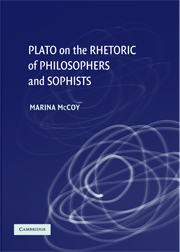Book contents
- Frontmatter
- Contents
- Acknowledgments
- 1 Introduction
- 2 Elements of Gorgianic Rhetoric and the Forensic Genre in Plato's Apology
- 3 The Rhetoric of Socratic Questioning in the Protagoras
- 4 The Competition between Philosophy and Rhetoric in the Gorgias
- 5 The Dialectical Development of the Philosopher and Sophist in the Republic
- 6 Philosophers, Sophists, and Strangers in the Sophist
- 7 Love and Rhetoric in Plato's Phaedrus
- Bibliography
- Index
6 - Philosophers, Sophists, and Strangers in the Sophist
Published online by Cambridge University Press: 18 July 2009
- Frontmatter
- Contents
- Acknowledgments
- 1 Introduction
- 2 Elements of Gorgianic Rhetoric and the Forensic Genre in Plato's Apology
- 3 The Rhetoric of Socratic Questioning in the Protagoras
- 4 The Competition between Philosophy and Rhetoric in the Gorgias
- 5 The Dialectical Development of the Philosopher and Sophist in the Republic
- 6 Philosophers, Sophists, and Strangers in the Sophist
- 7 Love and Rhetoric in Plato's Phaedrus
- Bibliography
- Index
Summary
If one were to seek a definitive answer to the contrast between the sophist and the philosopher, one might naturally turn to Plato's Sophist. The dialogue enumerates a number of collections and divisions, ending with a specific definition of the sophist. The dialogue's final definition of the sophist has the Stranger declaring that they have reached the truth about his nature:
The man, then, who has arisen from the contradiction-making art of the dissembling part of the opining art – the imitative man – who himself has sprung from the apparition-making kind descended from the image-making art and has marked off for himself the portion of making, not divine but human, that makes wonders in speeches – whoever claims that the sophist in his very being is of this “breed and blood” will, it seems, speak the utter truth (talêthestata) .
(268c–d).However, despite the Stranger's own sense of clarity about his definition of the sophist, Plato's own voice in the dialogue is more difficult to discern. Unlike most Platonic dialogues, in which Socrates is a major speaker, here Socrates sits silently at the feet of the Eleatic Stranger as he performs diaresis and explores metaphysics. The identity of this stranger is mysterious. While other dialogues such as the Theaetetus often give us detailed accounts of their character's personalities or biographies, the Stranger is never full explained. We know little about him, other than that he is from Elea.
- Type
- Chapter
- Information
- Plato on the Rhetoric of Philosophers and Sophists , pp. 138 - 166Publisher: Cambridge University PressPrint publication year: 2007

